SsangYong Korando vs Ford Puma – Differences & prices compared
Compare performance, boot space, consumption and price in one view.
Find out now: which car is the better choice for you – SsangYong Korando or Ford Puma?
The SsangYong Korando (SUV) comes with a Petrol or Electric engine and Manuel or Automatic transmission. In comparison, the Ford Puma (SUV) features a Petrol MHEV or Electric engine with Manuel or Automatic transmission.
When it comes to boot capacity, the SsangYong Korando offers 551 L, while the Ford Puma provides 523 L – depending on how much space you need. If you’re looking for more power, decide whether the 190 HP of the SsangYong Korando or the 168 HP of the Ford Puma suits your needs better.
In terms of consumption, the values are 16.80 kWh7.50 L per 100 km for the SsangYong Korando, and 13.10 kWh5.40 L for the Ford Puma.
Price-wise, the SsangYong Korando starts at 27000 £, while the Ford Puma is available from 24800 £. Compare all the details and find out which model fits your lifestyle best!
SsangYong Korando
The SsangYong Korando offers a blend of contemporary design and practicality, making it an appealing choice for urban adventurers. Its spacious interior and comfortable seating ensure a pleasant driving experience for both driver and passengers. With its reliable performance and advanced features, the Korando stands out in the competitive SUV market.
details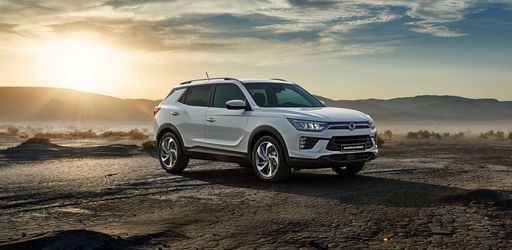 @ Ssangyong
@ Ssangyong
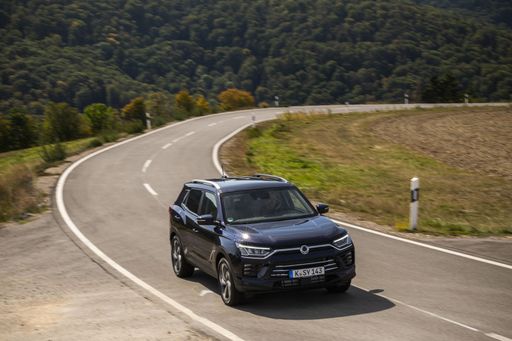 @ Ssangyong
@ Ssangyong
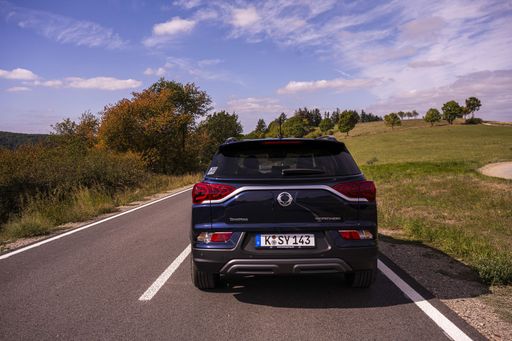 @ Ssangyong
@ Ssangyong
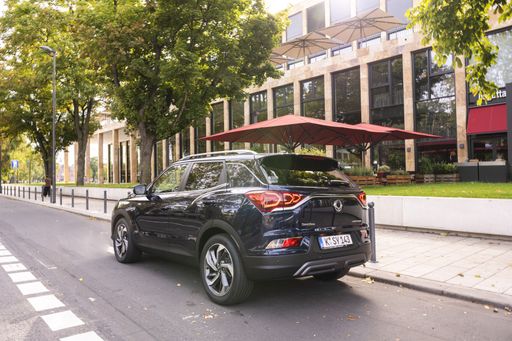 @ Ssangyong
@ Ssangyong
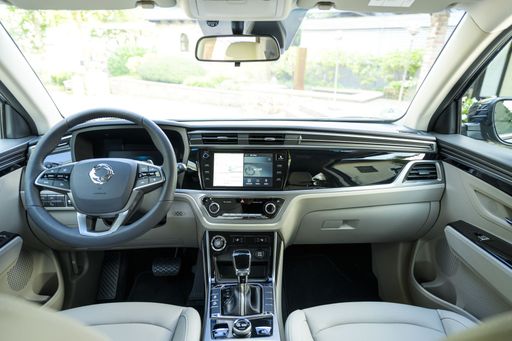 @ Ssangyong
@ Ssangyong
Ford Puma
The Ford Puma presents itself as a stylish compact SUV with a distinctive design that combines practicality with a dynamic driving experience. Its sleek lines and sporty aesthetics make it stand out on the road, while the interior offers a comfortable and tech-savvy environment. With an emphasis on efficiency and a smooth drive, the Ford Puma is well-suited for both urban commutes and countryside adventures.
details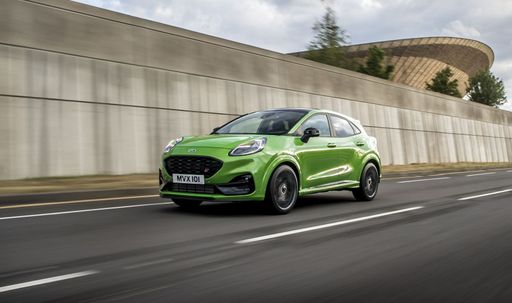 @ puma.fordpresskits.com
@ puma.fordpresskits.com
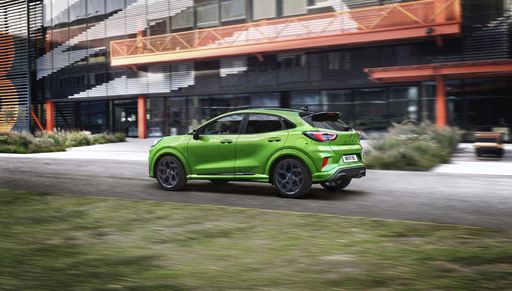 @ puma.fordpresskits.com
@ puma.fordpresskits.com
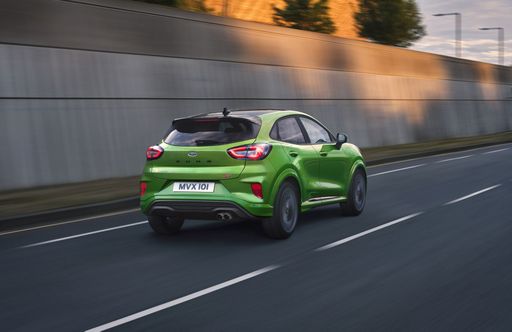 @ puma.fordpresskits.com
@ puma.fordpresskits.com
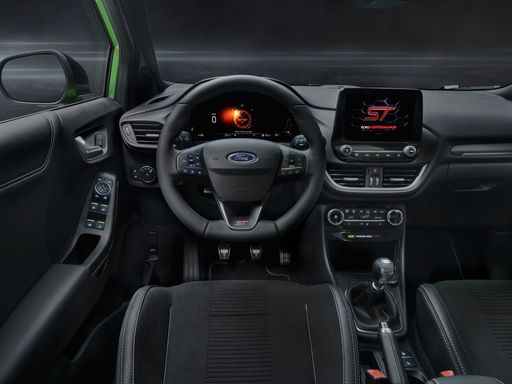 @ puma.fordpresskits.com
@ puma.fordpresskits.com

|

|
|
|
|
Costs and Consumption |
|
|---|---|
|
Price
27000 - 42000 £
|
Price
24800 - 36300 £
|
|
Consumption L/100km
7.5 - 8.6 L
|
Consumption L/100km
5.4 - 6 L
|
|
Consumption kWh/100km
16.80 kWh
|
Consumption kWh/100km
13.1 - 13.7 kWh
|
|
Electric Range
339 km
|
Electric Range
364 - 376 km
|
|
Battery Capacity
-
|
Battery Capacity
43 kWh
|
|
co2
0 - 197 g/km
|
co2
0 - 136 g/km
|
|
Fuel tank capacity
50 L
|
Fuel tank capacity
42 L
|
Dimensions and Body |
|
|---|---|
|
Body Type
SUV
|
Body Type
SUV
|
|
Seats
5
|
Seats
5
|
|
Doors
5
|
Doors
5
|
|
Curb weight
1517 - 1840 kg
|
Curb weight
1316 - 1563 kg
|
|
Trunk capacity
551 L
|
Trunk capacity
456 - 523 L
|
|
Length
4450 - 4465 mm
|
Length
4186 - 4226 mm
|
|
Width
1870 mm
|
Width
1805 mm
|
|
Height
1620 - 1645 mm
|
Height
1550 - 1555 mm
|
|
Payload
410 - 463 kg
|
Payload
367 - 469 kg
|
Engine and Performance |
|
|---|---|
|
Engine Type
Petrol, Electric
|
Engine Type
Petrol MHEV, Electric
|
|
Transmission
Manuel, Automatic
|
Transmission
Manuel, Automatic
|
|
Transmission Detail
Manual Gearbox, Automatic Gearbox, Reduction Gearbox
|
Transmission Detail
Schaltgetriebe, Automat. Schaltgetriebe (Doppelkupplung)
|
|
Drive Type
Front-Wheel Drive, All-Wheel Drive
|
Drive Type
Front-Wheel Drive
|
|
Power HP
163 - 190 HP
|
Power HP
125 - 168 HP
|
|
Acceleration 0-100km/h
8.40 s
|
Acceleration 0-100km/h
7.4 - 9.8 s
|
|
Max Speed
156 - 191 km/h
|
Max Speed
160 - 210 km/h
|
|
Torque
260 - 360 Nm
|
Torque
170 - 290 Nm
|
|
Number of Cylinders
4
|
Number of Cylinders
3
|
|
Power kW
120 - 140 kW
|
Power kW
92 - 124 kW
|
|
Engine capacity
1497 cm3
|
Engine capacity
999 cm3
|
General |
|
|---|---|
|
Model Year
2021 - 2023
|
Model Year
2024 - 2025
|
|
CO2 Efficiency Class
F, G, A
|
CO2 Efficiency Class
D, E, A
|
|
Brand
SsangYong
|
Brand
Ford
|
SsangYong Korando
Discovering the SsangYong Korando: Combining Performance with Innovation
The SsangYong Korando has persistently evolved, emerging as a formidable presence in the compact SUV segment. With a blend of intriguing design, versatile engine options, and cutting-edge technology, the Korando aims to cater to a diverse array of driving preferences and needs. In this article, we delve into the technical intricacies and pioneering innovations that define the vehicle.
A Versatile Engine Line-up: Catering to Petrol and Electric Enthusiasts
The Korando provides a remarkable variety of powertrains, accommodating drivers who favour both traditional petrol engines and modern electric motors. For petrol enthusiasts, the Korando comes equipped with a 1.5 GDI-T engine, boasting a power output of 163 PS. Available in both manual and automatic transmission, and offering either front-wheel or all-wheel drive, these variants promise a dynamically engaging driving experience.
The brand’s commitment to sustainability is evident with the introduction of the E-Motion model, which is powered by an electric motor delivering 190 PS. With a commendable range of 339 km and an energy consumption of 16.8 kWh/100km, the E-Motion exemplifies SsangYong's ambition to shape the future of eco-friendly motoring.
Technical Excellence: Performance and Efficiency
With a peak speed ranging between 156 to 191 km/h, the Korando ensures that drivers experience both agility and responsiveness. The petrol variants offer a respectable efficiency, with fuel consumption spanning from 7.5 to 8.6 L/100km, while the electric variant promotes zero emissions. This makes the Korando an optimal choice for those conscious of both performance and environmental impact.
Acceleration from 0 to 100 km/h in just 8.4 seconds—paired with a torque range of 260 to 360 Nm—ensures an exhilarating ride whether navigating city streets or venturing onto open highways. Moreover, with a robust towing capacity, the Korando stands as a reliable companion for any adventure.
Interior Quality and Innovative Features
Inside the Korando, occupants are greeted by a spacious cabin designed with emphasis on comfort and practicality. Advanced infotainment systems seamlessly integrate with connectivity features, ensuring that every journey is both entertaining and stress-free. Emphasising safety, the Korando is equipped with multiple driver-assistance systems, including adaptive cruise control and lane-keeping assist.
Mirroring its exterior aesthetics, the interior is crafted with premium materials, providing a serene ambience throughout the ride. With abundant luggage space, a family of five can effortlessly embark on long-distance travels without compromises on space or comfort.
Conclusion: A Synergy of Tradition and Modernity
The SsangYong Korando seamlessly merges robust performance with cutting-edge innovation, appealing to a wide demographic of drivers. Whether drawn to the unmistakable power of its petrol engines or the sustainable allure of its electric variant, prospective owners are sure to find a model that complements their lifestyle. The Korando remains an impactful player in the SUV landscape, continually adapting to the demands of modern-day motoring while staying true to its heritage.
Ford Puma
A Glimpse into the Ford Puma: Fusing Style with Innovation
The Ford Puma stands as a testament to modern engineering fused with style. This compact SUV is not just about aesthetics but brings to the table an array of technical innovations, topped with the reliability and performance Ford is known for. Let's delve into the technical specifics and innovative features that make the Ford Puma a stellar choice for any car enthusiast.
Powertrains and Performance
The Ford Puma is offered with a range of powertrains designed to deliver optimal performance whilst minimising fuel consumption. At the heart of this compact SUV is the 1.0 EcoBoost Hybrid engine, available in both 125 PS and 155 PS variants. This engine is a marvel of engineering, optimised to deliver power efficiently with a remarkable fuel consumption ranging from 5.4 to 5.7 L/100km for manual versions, and slightly higher for the automated variants.
The top-end 1.5 EcoBoost ST variant takes performance up a notch, providing a robust 200 PS that propels the Puma from 0 to 100 km/h in just 6.7 seconds. This variant is perfect for those who prioritise performance and exhilaration in their driving experience.
Mild-Hybrid Technology
The Puma's mild-hybrid technology plays a significant role in enhancing fuel efficiency and reducing emissions. By utilising a belt-driven integrated starter/generator, the Puma recovers energy usually lost during braking, storing it in a 48-volt lithium-ion battery. This stored energy is then used to assist the engine, providing a boost during acceleration and smoothing out the stop-start technology, ultimately leading to enhanced fuel efficiency.
Design and Comfort
The Ford Puma does not compromise on style and comfort with its ergonomic and stylish design. The SUV is available in multiple trims including the ST-Line, Titanium, and the luxurious Vignale editions, each offering unique aesthetic and technological enhancements. These trim levels provide varied offerings in terms of both exterior styling and interior comfort, ensuring there's a Puma that meets every personal preference.
Inside, the Puma offers a driver-focused cockpit with advanced technological integrations such as the SYNC 3 infotainment system, providing seamless connectivity and intuitive control of the vehicle's numerous technological features.
Safety and Technology
Safety remains paramount, and the Ford Puma is equipped with the latest security and technology features. It boasts the Ford Co-Pilot360 suite which includes adaptive cruise control, pre-collision assist with autonomous emergency braking, and lane-keeping assist, enabling a safer driving experience on both city roads and highways.
Versatility and Practicality
Beyond performance and safety, the Ford Puma shines in its versatility. With a boot capacity of 456 litres, it offers ample space for all sorts of adventures, whether you're heading on a family trip or loading sports equipment. Its innovative MegaBox is an extra storage solution, providing additional space below the boot floor.
The Puma's agile handling, paired with its compact dimensions—spanning a length of 4186 to 4266 mm and a width of 1805 mm—makes it an ideal choice for urban commuting and beyond.
Conclusion
In conclusion, the Ford Puma beautifully blends practical features with cutting-edge technology, offering a package that appeals to both the tech-savvy driver and those seeking comfort and reliability. Its range of innovative features, powerful yet efficient engine options, and a design that is both functional and stylish make it a frontrunner in the compact SUV market.
Whether you're drawn by the efficient mild-hybrid engines or the robust performance of the ST variant, the Ford Puma represents a modern driving experience where innovation meets everyday usability.
The prices and data displayed are estimates based on German list prices and may vary by country. This information is not legally binding.
